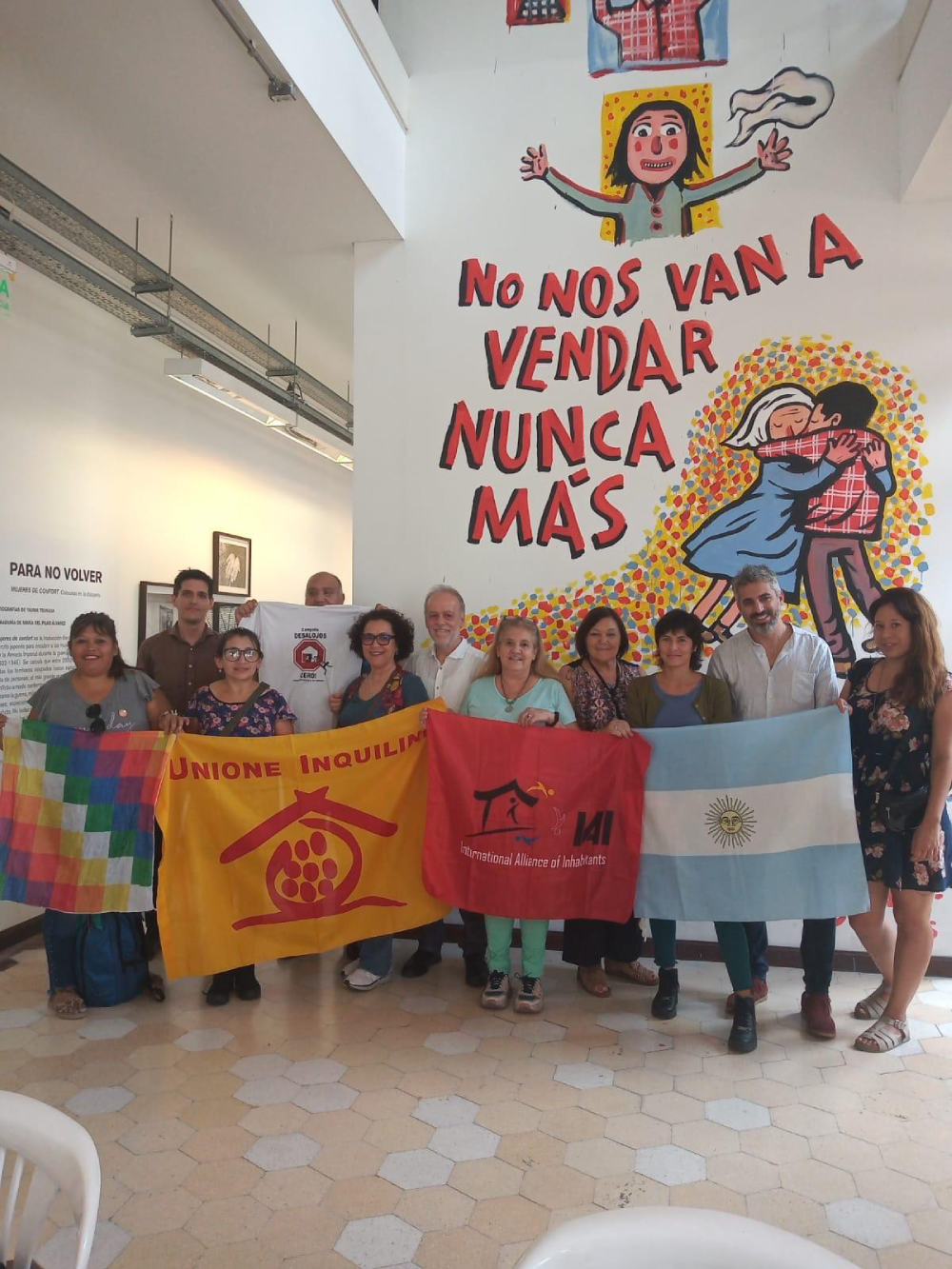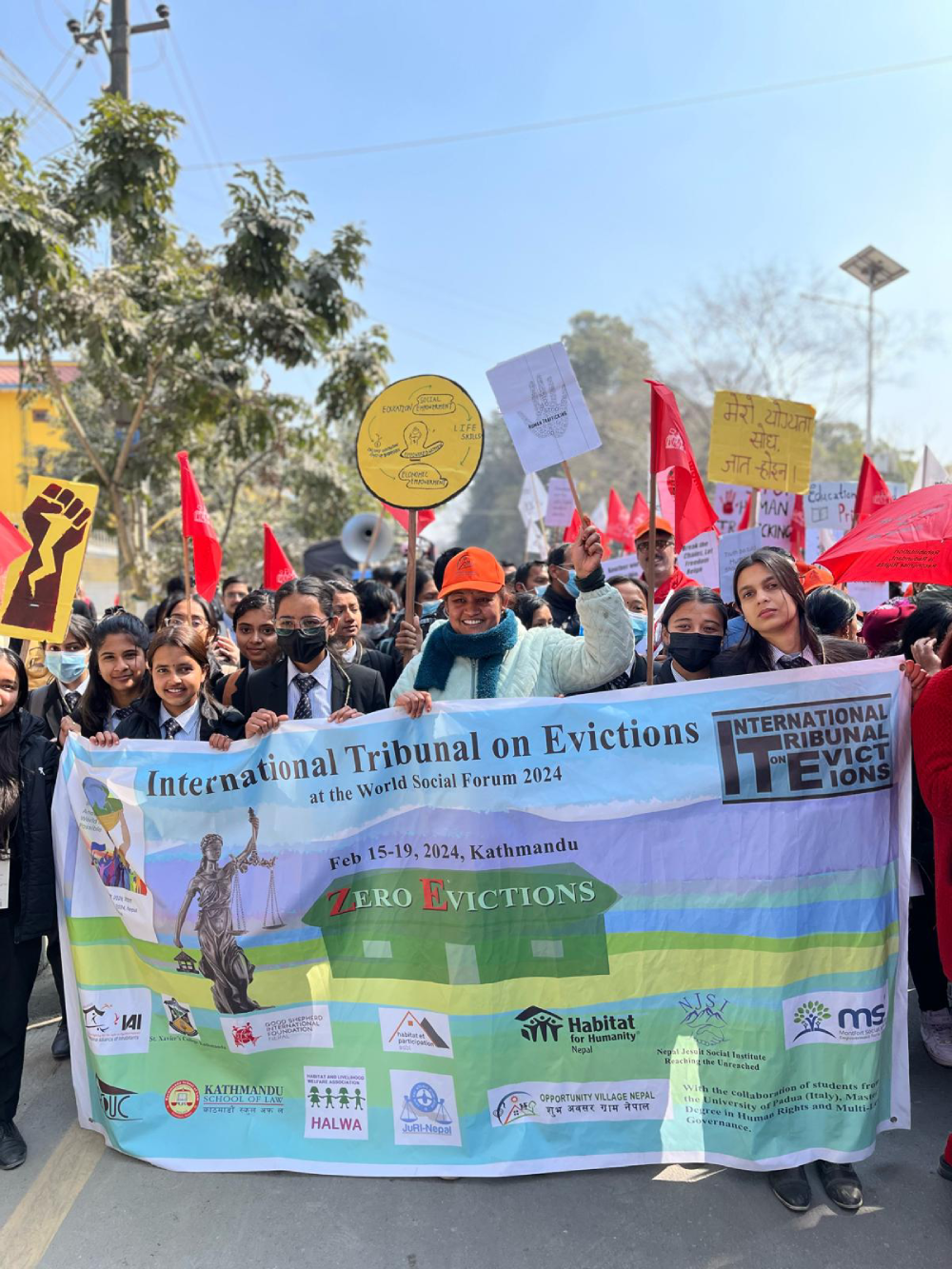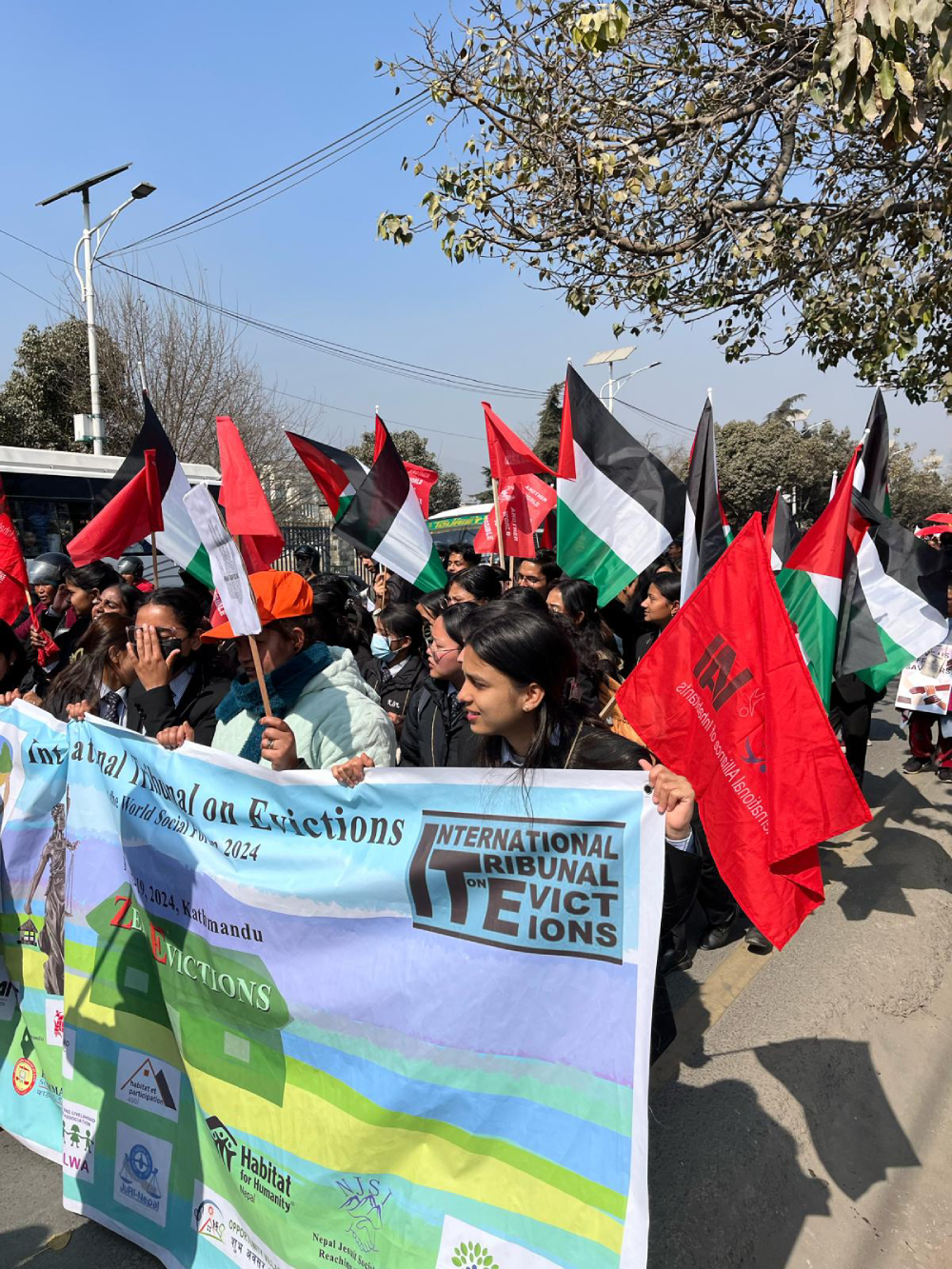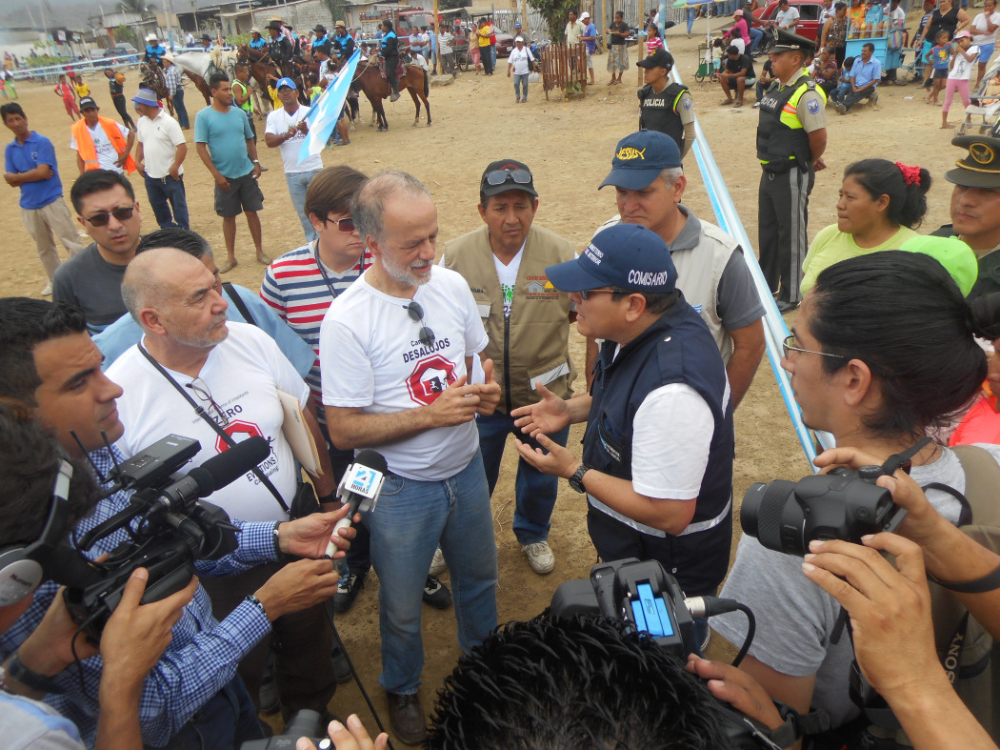I will tell you the story of a group of people committed to the struggle against human rights violations, especially the right to housing. They had known each other for years, they needed an independent space to mobilise rather than to carry out research or projects. A network of popular organisations capable of analysing, exchanging, and sharing experiences with a broad strategic horizon to provide effective responses to the housing crisis, not ideological constructions. In short, to contribute concretely to the construction of another possible world.
20 years later, the International Alliance of Inhabitants (IAI) is not only alive, but has already thrown down the gauntlet to the impact of Artificial Intelligence.
IAI: a “collective animal of a new type,” as Cesare Ottolini has always emphasised
One of the founders, Cesare Ottolini, IAI's global coordinator, recalls, "At the beginning, the idea was that HIC, the NGO founded in 1976 at Habitat I, could support these grassroots strategies." With this proposal, made explicit in 2000 in Mexico City at the first World Assembly of Inhabitants, he took on important responsibilities, from European coordinator to global coordinator until 2002. Despite having the support of the majority of active HIC members, this strategy was blocked by NGOs interested in projects rather than mobilisation. Hence the decision to go ahead anyway, confirmed in November 2002 at the European Social Forum in Florence, and the preparation of the founding meeting.
World Human Rights Forum, Buenos Aires, Argentina, 23rd of March, 2023.
Internationalism in the DNA, strength in activism and shared principles
It was on September the 12th 2003, when a dozen activists from inhabitants organisations, tenants' unions, and cooperatives from all continents met in Madrid to form the International Alliance of Inhabitants (IAI). The Charter of Founding Principles underlines the importance of strengthening the voice of the voiceless, from the local to the global level, as a strategic tool to build and consolidate the bonds of solidarity essential to protecting the right of inhabitants to be builders and users of cities.
Thus, at the beginning of the alter-globalisation movement, the IAI was born—a network, or rather, a strange collective animal, one of the first to structure itself on activism, its legs firmly anchored locally, its head attentive to global challenges.
Unione Inquilini (Italy), CONAM (Brazil), UCISV-Ver (Mexico), CENCA (Peru), CERPAC (Senegal), among others, laid the foundations of a network that today brings together more than a hundred organisations and social movements of inhabitants from all continents, communities, tenants, homeowners, homeless, shanty dwellers, cooperatives, indigenous peoples, and popular neighbourhoods from different regions of the world. A coordinating committee, made up of representatives from all continents, has been able to grow this intercultural, inclusive, autonomous, independent, self-managed, and solidarity-based movement.
Mumbai, World Social Forum 2004, the Global Zero Evictions Campaign is born
With this internationalist DNA, it is no an accident that the IAI is part of the processes promoted by the World Assembly of Citizens for a Responsible and United World and the World Social Forum endorsing the slogan, "Another world is possible".
Ottolini remembers it as if it were yesterday: "In that warehouse in Bombay, home of the World Social Forum, once dedicated tor Bollywood, on the 16th of January 2004, we decided to launch a challenge that would leave its mark: 'Zero Evictions', written on a blackboard, designing a structure based on local Antennas, unitary reference points founded on activism and responsibility".
Since the right to housing should be for all, no one should be evicted. If relocation is necessary, dignified, safe, and secure housing solutions must first be found and agreed upon with the affected inhabitants. This implies compliance with article 11 of the International Covenant on Economic, Social, and Cultural Rights, with particular reference to General Comment No. 4 of the UN Committee on Economic, Social, and Cultural Rights (1990).
Thanks to this uncompromising approach, the Zero Evictions Campaign has had an impact on all continents, articulated on several levels, determined by the degree of support and mobilisation of the organisations involved at the local level and the seriousness of the case being addressed.
Instruments? An international alert system with local antennae, calls for international solidarity with petitions and sit-ins at embassies, exchanges of experiences of grassroots organisations, involvement of the UN system with missions, and complaints using the Optional Protocol to the ICESCR. Alliances with progressive governments such as Venezuela and with local authorities, such as Bobigny, in the red belt of Paris and Rome, to set up ”territories free of evictions”, opposing administrative courts.
Zero Evictions has contributed to stopping hundreds of thousands of evictions worldwide, many millions if we take into account the moratoriums during the COVID pandemic of 2020-2022 in many countries, strongly demanded and obtained through the mobilisation of the Zero Evictions for Coronavirus Campaign and the support of the guidelines issued by the UN Rapporteur on the Right to Housing, to whose drafting, implementation, and follow-up the IAI actively contributed.
A campaign that every year, throughout the month of October, gives rise to the World Zero Evictions Days, with local and international initiatives on all continents. This October the 11th, 2024, the Human Rights Centre of the University of Padova, Italy, in cooperation with the International Alliance of Inhabitants (IAI) will hold the first “International Zero Evictions Marathon” (ZEM) as part of the World Zero Eviction Days (October 2024).
The weapon of the International Tribunal on Evictions
Among them, we mention the International Tribunal on Evictions (ITE), created by the IAI in 2011, to finally put those who evict, not the evicted, in the dock. This unprecedented court of opinion has so far organised ten thematic and territorial sessions on all continents, from Geneva to Milan, via Salvador de Bahia, New York, and Taipei. The last sessions were on the climate crisis at COP 25 (Santiago de Chile-Madrid, 5-8/12/2019) and the ITE Asia (WSF Kathmandu, 15-19/02/2024). Next should be the ITE session on gender violence.
Experience has shown that this is a powerful weapon. ITE's recommendations to the responsible institutions have, in many cases, succeeded in fostering dialogue between conflicting parties, laying the groundwork for dealing positively with specific crisis situations.
This is the case, for example, of the 2016 ITE session in Guayaquil, held in parallel to Habitat 3 despite the police ban, whose second session, held in 2021 in Guayaquil, marked the success of the recommendations, including the approval of a law to protect the more than 5,000 families under eviction.
Another ITE success is the suspension of the evictions of the Sengwer people of Embobut Forest (Kenya), threatened by the EU's water project under the label "conserve nature". The recommendations of the session on the climate crisis helped to establish a moratorium on evictions from 2019.
World Social Forum, Kathmandu, Nepal, February 2024, International Tribunal on Evictions.
World Social Forum, Kathmandu, Nepal, February 2024, International Tribunal on Evictions.
Zero evictions for emergencies and alternative policies, IAI proposals, and land and housing funds
Among the most effective examples we highlight the Zero Evictions Campaign "W Nairobi W!" supported together with the Kutoka Parish Network and the charismatic figure of Comboni missionary Father Alex Zanotelli. To consolidate the moratorium on 300,000 evictions, the campaign succeeded in getting the 40 million euros of Kenya's "debt" to Italy cancelled and part of it allocated to the improvement of the Korogocho slum.
This victory prompted the mobilisation and the proposal for the creation of the Popular Land and Housing Funds fed, in particular, by the resources released by the cancellation of the debts of impoverished countries, often unjust and unpayable, to finance housing policies based on housing as a right and a public and social service, not as a commodity. In other words, for public and cooperative housing.
The mobilisation for public services gained further momentum together with Public Services International and other networks with the launch in Santiago de Chile in 2019 of The future is public: Global Manifesto for Public Services.
With the same objective of taking housing out of the speculative market, mobilisations for regulations that prohibit evictions without adequate alternative housing and for calming the market were introduced, not only at the national level, but also at the regional level, in particular with the adoption of the European Parliament Resolution on 2021.
Negotiations with the Guayaquil Police threatening to veto the session of the International Tribunal Evictions Tribunal, Guayaquil, Ecuador, 15th of October, 2016.
The Urban Popular University, inhabitants and teachers co-producing knowledge
How to socialise this wealth of content without distorting it with academic approaches? The answer was the creation of the Urban Popular University which practices and theorises the co-production of knowledge through an egalitarian relationship between social leaders and academics. Research and publications are thus the fruit of training, carried out with the priority of providing tools for inhabitants' resistance to housing and urban policies based on neoliberalism, focusing instead on human rights and dignity.
Among the most relevant initiatives are the collaboration agreements and international exchanges of inhabitants with the University of Buenos Aires, Lima, and Santo Domingo.
Giving inhabitants a voice, at home and internationally
From the outset, to accomplish this seemingly impossible mission, the IAI equipped itself with innovative tools for the time, relying almost exclusively on activism, not million-dollar projects. First a website in five languages, 26 regional newsletters in as many languages, connecting more than 130,000 users in over 100 countries.
Subsequently, thematic and regional FB pages were created, but the real social and zoom boom was to cope with the restrictions caused by the COVID pandemic. With what resources? Mainly activism, including that of an extraordinary network of more than 120 volunteer translators/interpreters.
Walking together on the Urban and Community Way, Independents and dialoguing
The Urban and Community Way was borrowed from our friends and comrades of La Via Campesina by IAI. It is the strategy that is committing the IAI to coordinate with other organisations pursuing the same objectives. The strategy was done by founding with others the Global Platform for the Right to the City and by developing collaboration with, among others, the Public Services International, Droit à l'Energie, and the World Meeting of Popular Movements with Pope Francis.
This unified strategy was put into practice during the sessions of the World Assembly of Inhabitants from the second one held at the WSF in Dakar in 2011, after the first one in Mexico City in 2000, to the subsequent ones held at the WSF in Tunis in 2013 and 2015.
This approach helped to develop the independence and influence of the inhabitants vis-à-vis other actors, not only the financial and institutional architects of the housing crisis, from the IMF to the World Bank via the Asian Development Bank, but also vis-à-vis the UN system.
The IAI has always developed a positive partnership with the UN Rapporteur on the right to housing, from Miloon Kothari to Raquel Rolnik, from Leilani Farha to Rajagopal, the current Rapporteur. But while the work of the UN rapporteurs is severely constrained by modest budgets, UN Habitat has a real impact thanks to the significant budgets from the states and multinationals with which it collaborates.
These were the premises of Habitat 3, the 20-year Habitat Summit organised by the UN in Quito in 2016, which marked a real turning point in the relationship between UN Habitat and social organisations.
Gone are the references to the right to housing in the Habitat Agenda adopted in Istanbul in 1996 at Habitat 2. The New Urban Agenda (NUA) accepts precisely the neoliberal paradigms that have caused the global housing and environmental crisis: urban development without limits, driven by cities and favoured by public-private partnerships—a relationship subordinated to the developmentalist policies of multinational corporations, bent on financialising and privatising resources.
For example, if we talk about water, while people's organisations together with the IAI were campaigning against evictions caused by dams to privatise the waters of the Narmada River in India, UN-Habitat signed a partnership agreement with Coca Cola, also in India.
"According to realistic estimates, there are at least 70 million evicted people worldwide," denounces Ottolini. "However, there is no 'evictions' indicator to measure Development Goal N° 11, which has now failed, since, instead of decreasing, homeless and poorly housed people now number more than 1.6 billion." Why, he wonders, has UN-Habitat decided to disband the Advisory Group on Forced Evictions (AGFE), the group of international experts, of which the IAI was also a member, that had been set up with the aim of checking how to deal with evictions on the ground? Perhaps because of its successes.
These are the compelling reasons for the reaction of social organisations to the successful organisation of the Social Forum for Re-Existence to Habitat 3—of which the IAI was one of the main promoters. The Quito Manifesto articulates a critical thinking and a real Inhabitants' Solidarity Agenda that remains a strong reference.
Independent participation in the various editions of Africities, the launch of the Mediterranean Inhabitants Network, one of many initiatives in Latin America, paved the way for the true blossoming of international meetings, which exploded with the COVID pandemic and led to the organisation of Inhabitants' Assemblies on all continents. To date, we are already at the seventh world session, held in Mexico City in the framework of the WSF 2022, in a hybrid format from now on.
More than 1,100 committed activists from all continents are committed.
IAI independence, thanks to the resources of social organisations and activist leadership
"How do we finance ourselves? Millions of euros a year would not be enough," confesses Ottolini. "We are proud to ground our actions on shared principles, on the pooling of social capital and on the activism of our members, much and passionate. It is consistent with the need and the importance of the inhabitants regaining their own voice, with their own structure, to be able to have a direct impact, without having to submit to the obligations that may derive from the financing of entities linked, more or less directly, precisely to those who caused the real estate crisis. It is exhausting, but this independence, which is priceless, makes us really express our solidarity and professionalism."
"When we get financial support, it is always on the basis of equal partnership," Ottolini stresses. "Because if someone provides the financial resources, the IAI provides much more: the commitment, the solidarity of real people, and the capacity to resist with alternative proposals."
The challenge of Inhabitants' Solidarity Intelligence to Artificial Intelligence
Thanks to this independent approach, which feeds the freshness and know-how of 20 years of engagement without borders, the IAI was the first network to warn about the negative impact of artificial intelligence on housing and territories, the tool of the 4th industrial revolution based on "cognitive capitalism".
In the framework of the World Zero Evictions Days, the IAI organised on October the 31st 2023, "The Challenge of Artificial Intelligence for the Right to Housing".
Reports by experts, professors, and researchers, as well as by Rajagopal, the UN rapporteur on the right to housing, unveiled the danger behind the special effects, analysing how we are already and ever more rapidly entering into the mechanisms of AI. These include digital real estate platforms, whose algorithms inflate prices, drive financialisation, and amplify social, gender, and racial discrimination.
The administration of justice, increasingly automated on the basis of a conservative and reactionary approach to the defence of human rights, is also something that AI may be able to do quite soon—potentially governing cities, from "smart cities" to "automated cities", i.e. running them with algorithms that respond to the needs of the budget, i.e. the profit of investors, and not to the constitutional primacy of rights and democracy.
The most extreme model is The Line project—a 170 km linear city under construction with an investment of 500 billion dollars in Saudi Arabia, which has already led to the eviction of 20,000 people. Rights? Guaranteed only to investors and robots—the first being Sophia in 2017, which can obtain citizenship thanks to a recent amendment to the Constitution.
"We have taken up and relaunched the challenge," Ottolini announced. "We have set up a multidisciplinary working group which, starting from the inhabitants' point of view, will collect, systematise, and analyse this information, make it available, define appropriate advocacy tools, and train inhabitants' organisations. Especially, but not only, the younger generation".
As the challenge concerns everyone, we are talking to other like-minded social and trade union sectors. It is a matter of rethinking and mobilising the re-existences of the inhabitants, which can be supported by solidarity intelligence, potentially much stronger than any algorithm or robot.
Instead, if we settle for being resilient, as the neoliberal mantra suggests, we will end up like the cockroaches that have been on Earth for 300 million years, i.e. we will end up subservient to the AI masters, if not to the AI itself.



















